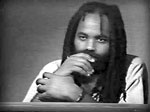Cause for hope in Mumia case
By
Betsey Piette
Philadelphia
Published Dec 15, 2005 11:42 PM
As supporters of
imprisoned African-American journalist Mumia Abu-Jamal gathered here on Dec. 9
to observe the 24th anniversary of his arrest, there was new cause for
hope.
The U.S. Court of Appeals of the Third Circuit had just decided, on
Dec. 7, to hold hearings on three claims by Abu-Jamal that his 1982 trial,
overseen by “hanging” Judge Albert Sabo, and a subsequent hearing
were tainted by constitutional violations.
If any one of the three claims
is upheld by a three-judge panel, it could lead to a new trial for Abu-Jamal,
who still sits on Pennsylvania’s death row despite a 2001 ruling by
Federal District Court Judge William Yohn overturning his death
sentence.
At the annual commemoration, attorneys Leslie Jones and Michael
Coard explained the significance of the court ruling, while reminding
Abu-Jamal’s supporters that the Third Circuit Court, of which Supreme
Court nominee Samuel Alito is a member, has never been a friend of workers and
oppressed people.
The Third Circuit’s rulings granted two
“certificates of appealability” that allow Abu-Jamal to challenge
alleged race and judicial bias in his 1995 Post-Conviction Relief Action
proceedings. Like the trial, these proceedings were also overseen by Sabo, who
went to extreme lengths to keep evidence of Abu-Jamal’s innocence out of
the court record.
Jones noted that 29 of the 32 people of color on
Pennsylvania’s death row were put there by Sabo.
The ruling also
allows Abu-Jamal to challenge the trial summation remarks of the state’s
lead prosecutor, Joseph McGill, who instructed the jury: “If you find the
defendant guilty of course, there would be appeal after appeal and perhaps there
could be a reversal of the case, or whatever, so that may not be final.”
This made it easier for the jury to convict.
McGill also used the fact
that Abu-Jamal had been a member of the Black Panther Party when he was 16,
claiming Abu-Jamal “had always wanted to kill a police
officer.”
According to Abu-Jamal’s lead attorney, Robert R.
Bryan, McGill’s statements had the effect of qualitatively lowering the
historic burden of proof regarding reasonable doubt and presumption of
innocence. Similar remarks by Pennsylvania prosecutors have resulted in new
trials in other cases. However, Jones cautioned that “the rules never seem
to apply in Mumia’s case.”
The Third Circuit Court’s
decision was a surprise, however, because the appellate court was only required
to consider an appeal from the defense on a single guilt-phase issue: that the
prosecution had illegally removed qualified jurors from the case on the basis of
race. While Judge Yohn rejected this claim in 2001, the appellate court had
previously agreed to take up the issue.
Racism in jury selection was
well documented in Abu-Jamal’s case. The defense appeal was based on the
charge that exclusion of 11 of 14 Black jurors constituted an unconstitutional
violation of the Supreme Court ruling on this issue in the case of Batson v.
Kentucky.
Prosecutor McGill has a record in murder trials of rejecting
roughly three out of four potential Black jurors—even after they had
already agreed they would vote for capital punishment. This was a rate of
peremptory rejection of qualified jurors three times higher than for potential
white jurors.
Under the provisions of the 1996 Anti-terrorism and
Effective Death Penalty Act, the court had no obligation to consider defense
challenges to the Federal District Court ruling, so the fact that the judges
agreed to hear two other claims is a major victory for the
defense.
However, attorney Jones pointed out that Abu-Jamal’s
previous defense team, led by Attorney Leonard Weinglass, submitted 29 claims
when filing the Petition for Writ of Habeas Corpus on Mumia’s behalf.
Jones noted, “The Third Circuit Court chooses to ignore the 26 other
claims, as well as the affidavits of former Philadel phia Court stenographer
Terri Mauer-Carter that she overheard Sabo in 1982 make the statement
‘Yeah, and I’m going to help them fry the n****r’ in reference
to Abu-Jamal; nor the affidavit by Arnold Beverly, that he, not Abu-Jamal,
murdered Officer Faulkner.”
“They are just pulling out some
pieces, but it’s okay,” Jones noted. “Mumia has so many issues
in his case that have brought other people home; however, Mumia is still on
death row.”
Attorney Michael Coard, along with Pam Africa of
International Concerned Family and Friends of Mumia Abu-Jamal, cautioned that
this is probably the most critical time ever in the case. “The courts will
do what they are forced to do,” said Africa. “These people will
never tell you how powerful the movement is, yet it’s the movement that
has kept Mumia alive for the past 10 years.”
The case is now on the
fast track, with stringent deadlines set for filing a series of briefs and
counter briefs, beginning as early as Jan. 17, 2006. Once completed, the court
will issue a decision or set a date for a hearing and oral arguments.
Articles copyright 1995-2012 Workers World.
Verbatim copying and distribution of this entire article is permitted in any medium without royalty provided this notice is preserved.
Workers World, 55 W. 17 St., NY, NY 10011
Email:
[email protected]
Subscribe
[email protected]
Support independent news
DONATE


